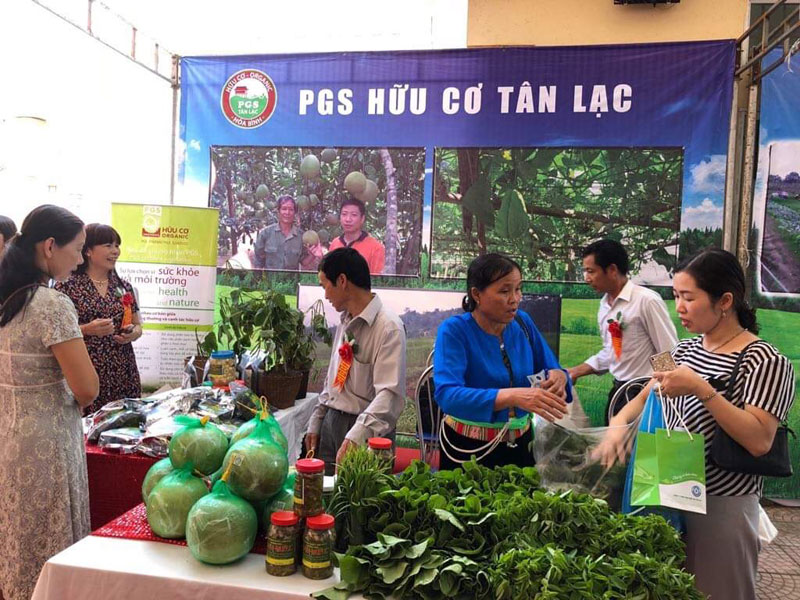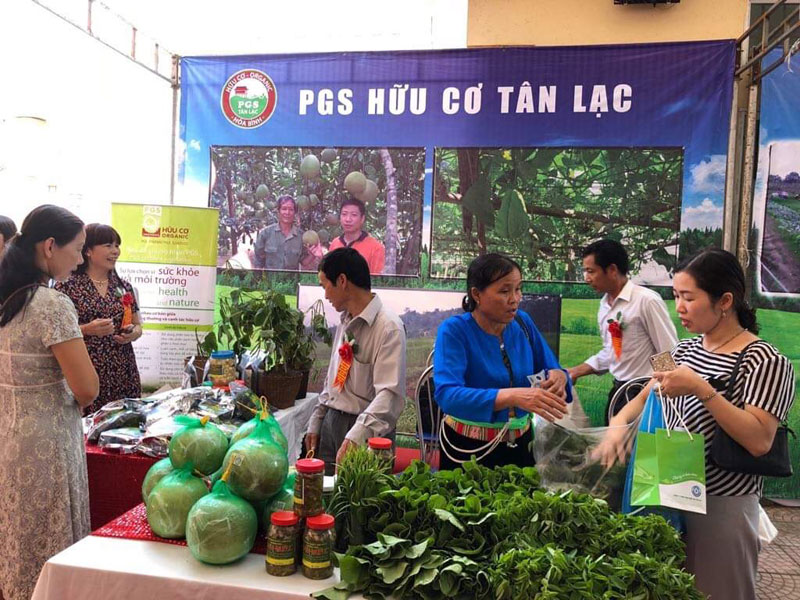
(HBO) – Tan Lac district in the northern mountainous province of Hoa Binh is working to remove bottlenecks for safe vegetable production as it has not yet set up any clean vegetable store.

Popularising local products at organic agricultural fairs is considered as the initial
step of Tan Lac district to seek consumption markets for its vegetables.
The
first safe vegetable cultivation cooperative group was set up in Sung hamlet,
Thanh Hoi commune, which focuses on growing seasonal crops with main vegetables
such as mustard greens, amaranth, aubergine, wax gourd, and cucumber.
According to head of the cooperative group Bui Van Thuan, the cooperative group
has been operational in four years, and some 2-3 hectares of land were zoned
off for plantation of safe vegetables. However, they are being sold at the same
prices as those without clear origin.
Thuan attributed the results to the fact that the vegetables have not been put
into the value chain, and they have no brand registration for consumers to
compare.
About 8-10 years ago, the mountainous communes of Quyet Chien, Ngo Luong, Lung
Van and Nam Son successfully expanded chayote plantation with the support of
the provincial Department of Science and Technology. Currently, chayote is
being grown in an area of nearly 95 hectares, 60 hectares of which are in Quyet
Chien commune. Particularly, there are 25 hectares in the commune receiving
VietGAP certification.
Local efforts in promoting good agricultural practice, building brands and
developing markets have paid off. Quyet Chien chayote has ridden out of the
shade of the same vegetable in Vinh Phuc province’s Tam Dao district, and has
been favoured by consumers after hitting the shelves of supermarkets in Hanoi.
In addition, thanks to favourable climate,
farmers in Tan Lac’s mountainous communes have developed non-traditional crops
such as tomato, cabbage and Korean beet on an area of 5 hectares./.
According to data from the Hoa Binh Provincial Party Committee, the industrial production index for the first six months of 2025 is estimated to have increased by 20% compared to the same period last year. This marks the highest year-on-year growth rate for this period since 2020.
In the first six months of 2025, Hoa Binh province’s export turnover was estimated at 1.145 billion USD, marking an 18.11% increase compared to the same period in 2024. Import turnover was estimated at $ 804 million, a 17.15% increase, which helped the province maintain a positive trade balance.
The lives of the ethnic minority farmers in Tan Lac district have gradually improved thanks to the new directions in agricultural production. This is a testament to the collective strength fostered through the professional associations and groups implemented by various levels of the district’s Farmers’ Union.
With the motto the "product quality comes first,” after nearly one year of establishment and operation, Muong village’s Clean Food Agricultural and Commercial Cooperative, located in Cau Hamlet, Hung Son Commune (Kim Boi district), has launched reputable, high-quality agricultural products to the market that are well-received by consumers. The products such as Muong village’s pork sausage, salt-cured chicken, and salt-cured pork hocks have gradually carved out a place in the market and they are on the path to obtaining the OCOP certification.
In the past, the phrase "bumper harvest, rock-bottom prices" was a familiar refrain for Vietnamese farmers engaged in fragmented, small-scale agriculture. But today, a new spirit is emerging across rural areas of Hoa Binh province - one of collaboration, organisation, and collective economic models that provide a stable foundation for production.
Maintaining growing area codes and packing facility codes in accordance with regulations is a mandatory requirement for agricultural products to be eligible for export. Recently, the Department of Agriculture and Environment of Hoa Binh province has intensified technical supervision of designated farming areas and packing facilities to safeguard the "green passport" that enables its products to access international markets.



